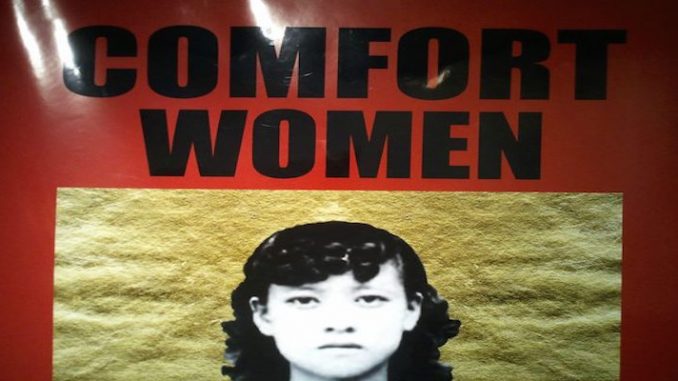
Women who were heavily used as sexual slaves during WWII want governments to own up to their wrongdoings and apologize.
From ABC News:

BYPASS THE CENSORS
Sign up to get unfiltered news delivered straight to your inbox.
You can unsubscribe any time. By subscribing you agree to our Terms of Use
Latest Video
Most Wednesdays 90-year-old Kim Bok Dong goes to the Japanese Embassy in the South Korean capital, Seoul, to demonstrate.
Remarkably, she has been there almost a thousand times and for one simple reason: Ms Kim wants the Japanese government to formally apologise for its use of 200,000 comfort women or sex slaves before and during World War II.
“I’ve got no choice,” Ms Kim told 7.30.
“I’ve taken out my sword and I can’t put it back. I have to finish what I’ve started.”
Many in the Japanese government are trying to say it is a fiction, that the women were not forced and went willingly to the military brothels.
Ms Kim said that was deeply insulting: “I want Japan to repent as soon as possible and apologise and compensate so we can recover our tarnished honour,” she said.
At 14 years of age, Ms Kim said, a Japanese official with a Korean accomplice came to her poor village near the modern day city of Busan and told her they had a job for her in China making military uniforms.
She said she was part of a quota system that tricked young girls all over Korea.
Ms Kim said she was treated like luggage and shipped around the frontlines of Taiwan, China, Malaysia, Indonesia and Singapore and was forced to have sex with countless Japanese troops.
“Soldiers used to queue up,” she said.
“I didn’t know what day it was or how it passed. In the evening I couldn’t stand up, I didn’t have any strength in my legs.”
There are those in Japan who have apologised.
Former prime minister Murayama issued a landmark apology in 1995 and now wants the current prime minister Shinzō Abe to confront the issue tomorrow when he is expected to give a much anticipated apology to the world for Japan’s wartime aggressions.
“The fact is that the government, the army, the military set up the military brothels as a necessary part of the military strategy,” Mr Murayama told 7.30.
“The military ordered them to be made. The military entrusted traders, managed and cooperated with them — there is no mistake about that.”
But Mr Abe has undermined Mr Murayama’s statement and also the apology by Japan’s chief cabinet secretary, Yohei Kono, in 1993 that dealt directly with comfort women.
He has questioned them and ordered a review.
Members of his government argue there is no documented evidence that the girls were forced, and the military had no role procuring and managing the comfort women.
Victims want ‘broken hearts mended’
But the South Korean government also has its own ugly past with comfort women that it will not confront.
After the Korean war effectively ended in 1953, the government helped set up and manage whole communities of prostitutes for the massive US forces that stayed to protect South Korea.
They called them camp towns, and by some estimates by human rights groups, 300,000 South Korean women were used to service US troops in the years 1950 to 2000.
Sixty-year-old Park Young-ja was an American comfort woman, and like the Japanese comfort women she said she was tricked.
When she was 15, a job centre told her they had found her a job as a cleaner, but instead she had been sold to a pimp in one of the camp towns.
“I want the government to apologise to us and recognise that we had no choice,” Park Young-ja told 7.30.
“My country organised it. They didn’t care about us or our lives but only cared if we had sexual diseases and detained us.”
The American comfort women feel they have been left poor, stigmatised and forgotten.
My Sisters Place, one of the few organisations providing assistance to American comfort women, is helping them take the South Korean government to court.
The centre’s director You Young-nim said she wanted the government to provide compensation.
“What we want is for the South Korean government to take responsibility and provide some very minimum compensation and through this process we hope the women can have their broken hearts mended,” she told 7.30.
Both the American and Japanese comfort women said that on the 70th anniversary of the end of World War II it was time for the leaders of South Korea and Japan to stop playing politics and recognise them as victims of war.


